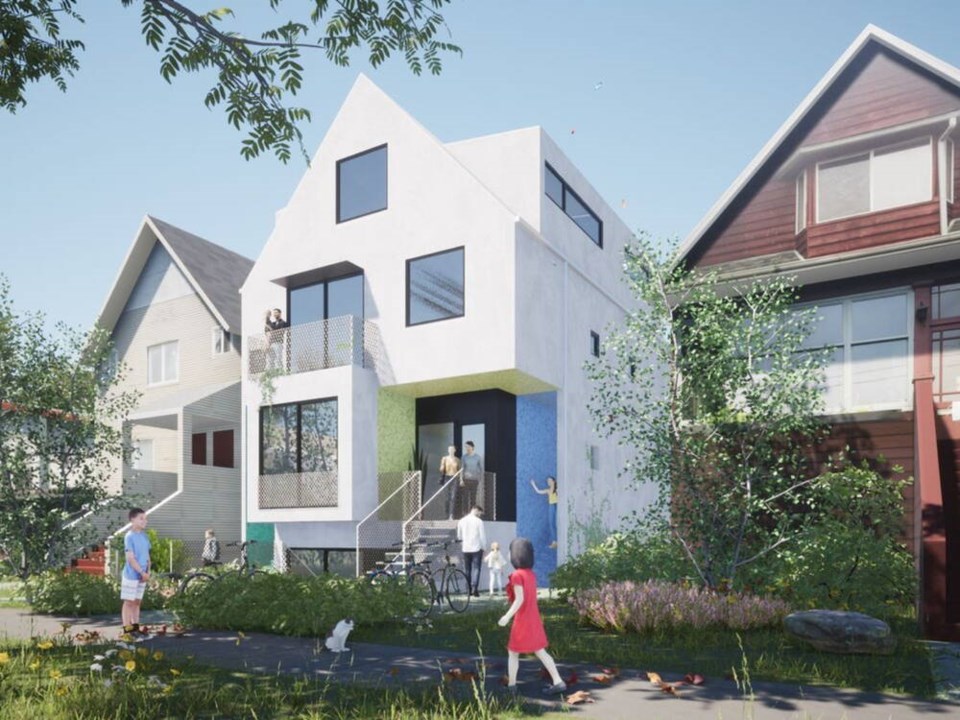Vancouver Mayor Kennedy Stewart has called for the city to allow up to six homes on single-family lots, a year after a similar proposal was rejected by city council.
Stewart held a news conference to outline his newest plan to allow large detached houses to be converted or redeveloped into several units that could be rented out or sold as condos.
Stewart plans to introduce the motion at a council meeting in January. Some observers noted that means the debate is likely to carry into the October 2022 municipal election campaign.
Stewart described his proposal as a “bold” move to create more sustainable, more-vibrant neighbourhoods and add affordable options for working families priced out of the housing market in recent years as successive councils failed to take decisive action.
The program would be designed to limit speculation, Stewart said, with mechanisms to “capture” the increase in land value and use those funds for priorities including social housing, child care and tackling climate change.
A draft version of Stewart’s motion describes a policy allowing up to 2,000 lots to be considered initially for these redevelopments, with “modest height increases to ensure compatibility with neighbouring buildings.”
Marianne Amodio, an architect with MA + HG Architects, told the news conference she wanted to dispel the notion that these bylaw changes would produce buildings that were large and out-of-context.
The buildings considered in such a program, Amodio said, would not necessarily look out of place on the city’s residential streets, and she showed renderings of a design for a four-unit primary building separated by a back yard from a two-unit laneway house.
“This is not a new idea,” said Amodio.
For many years, she said, she and other architects have looked at how to add “more legal homes to exclusive zoning.”
Reporters asked Stewart why he was introducing this proposal now, after he tried a year ago to float a very similar proposal, which was not supported by council.
Stewart said he had spoken with councillors after his “dry run” last year failed to get the necessary support, and he’s optimistic his new, slightly modified proposal will succeed.
Last year, Stewart tried to introduce his six-units-on-one-lot pilot project as an amendment to another councillor’s motion. Speaking Wednesday, he said some councillors told him they didn’t support last year’s proposal because “they didn’t have a lot of time to think about it due to the nature of the way it was introduced. And that’s on me. I brought it in as an amendment to a more general motion, where I should have brought it in as a full motion, and that’s what I’m doing now.”
Before the new motion is debated in January, councillors, city staff and the public should have plenty of time to consider it, Stewart said. “Starting in 2022, that’s the choice ahead of us: Are we going to do this or not? I know where my vote is.”
Reporters asked Stewart how the timing of approving and implementing such a program might play out given the election looming on Oct. 15, 2022.
Stewart said he “hadn’t really thought about that,” drawing laughs from a few journalists in the room, before he added: “If it was before (the election), that’s fine, if it’s after, that’s fine, too. It’s really what’s good for the city.”
University of B.C. associate professor Tom Davidoff, who also appeared Wednesday to endorse the mayor’s proposal, said “it’s hard to see how this wouldn’t be a pretty key topic in the election.”
After the new conference, Davidoff said, “This is a pretty concrete example of the kind of thing that could be acceptable to a lot of people. … Debating whether we want to have absolute status quo, or this logical, incremental step seems, to me, like absolutely the right way to discuss housing in the election.”
While Stewart’s proposal is likely to be opposed by some members of the public and political opponents, Davidoff said, “it would be very wise for him to make this a wedge issue.”
twitter.com/fumano



